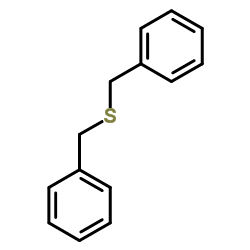Disassembly of microtubules and inhibition of neurite outgrowth, neuroblastoma cell proliferation, and MAP kinase tyrosine dephosphorylation by dibenzyl trisulphide.
H Rösner, L A Williams, A Jung, W Kraus
文献索引:Biochim. Biophys. Acta 1540(2) , 166-77, (2001)
全文:HTML全文
摘要
Dibenzyl trisulphide (DTS), a main lipophilic compound in Petiveria alliacea L. (Phytolaccaceae), was identified as one of the active immunomodulatory compounds in extracts of the plant. To learn more about its biological activities and molecular mechanisms, we conducted one-dimensional NMR interaction studies with bovine serum albumin (BSA) and tested DTS and related compounds in two well-established neuronal cell-and-tissue culture systems. We found that DTS preferentially binds to an aromatic region of BSA which is rich in tyrosyl residues. In SH-SY5Y neuroblastoma cells, DTS attenuates the dephosphorylation of tyrosyl residues of MAP kinase (erk1/erk2). In the same neuroblastoma cell line and in Wistar 38 human lung fibroblasts, DTS causes a reversible disassembly of microtubules, but it did not affect actin dynamics. Probably due to the disruption of the microtubule dynamics, DTS also inhibits neuroblastoma cell proliferation and neurite outgrowth from spinal cord explants. Related dibenzyl compounds with none, one, or two sulphur atoms were found to be significantly less effective. These data confirmed that the natural compound DTS has a diverse spectrum of biological properties, including cytostatic and neurotoxic actions in addition to immunomodulatory activities.
相关化合物
| 结构式 | 名称/CAS号 | 分子式 | 全部文献 |
|---|---|---|---|
 |
二苄基硫醚
CAS:538-74-9 |
C14H14S |
|
Singlet oxygen promoted carbon-heteroatom bond cleavage in d...
2007-12-07 [J. Org. Chem. 72(25) , 9582-9, (2007)] |
|
Functional groups and sulfur K-edge XANES spectra: divalent ...
2010-09-09 [J. Phys. Chem. A 114(35) , 9523-8, (2010)] |
|
Dibenzyl sulfide metabolism by white rot fungi.
2003-02-01 [Appl. Environ. Microbiol. 69(2) , 1320-4, (2003)] |
|
[Diffusional system for examination of the solubility and pe...
1980-01-01 [Zentralbl. Bakteriol. Naturwiss. 135(4) , 308-12, (1980)] |
|
A combined theoretical and experimental investigation on the...
2009-12-14 [Chemistry 15(48) , 13417-26, (2009)] |